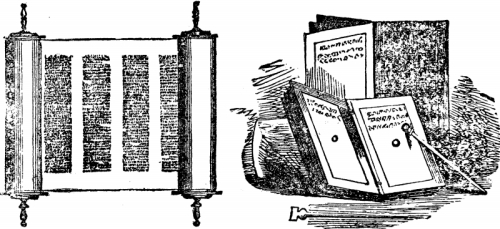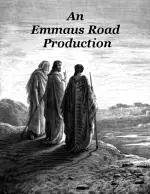Introduction (Revised 02/06/2016)
All born-again believers are aware that Jesus paid for every one of the sins we have ever committed or will commit, without exception.
Yet what we do not feel as comfortable in considering is that many times there are dire consequences that we pay for those sins that we perform in the flesh.
We all remember the story of Peter denying Christ three times before the cock crowed, which is recorded in all four of the Gospels (In God’s word, the more that God repeats something, the more emphasis He places on it for our consideration), as seen in Matthew 26:31-34, which states:
“Then saith Jesus unto them, All ye shall be offended because of me this night: for it is written, I will smite the shepherd, and the sheep of the flock shall be scattered abroad. But after I am risen again, I will go before you into Galilee. Peter answered and said unto him, Though all men shall be offended because of thee, yet will I never be offended. Jesus said unto him, Verily I say unto thee, That this night, before the cock crow, thou shalt deny me thrice.“
And thus it was fulfilled…
“Now Peter sat without in the palace: and a damsel came unto him, saying, Thou also wast with Jesus of Galilee. But he denied before them all, saying, I know not what thou sayest. And when he was gone out into the porch, another maid saw him, and said unto them that were there, This fellow was also with Jesus of Nazareth. And again he denied with an oath, I do not know the man. And after a while came unto him they that stood by, and said to Peter, Surely thou also art one of them; for thy speech bewrayeth thee. Then began he to curse and to swear, saying, I know not the man. And immediately the cock crew. And Peter remembered the word of Jesus, which said unto him, Before the cock crow, thou shalt deny me thrice. And he went out, and wept bitterly.” ~ Matthew 26:69-75
During the days that Christ walked on earth after His resurrection, we notice a profound change in Peter.
The once outgoing braggart, who claimed to be the most devoted of the disciples is seen as quiet and reserved, almost hanging around the outside of the group – humiliated and sorely vexed because of his denial of his Lord.
We must view the following event recorded in the 21st chapter of John, in light of Peter’s denial of Christ, when he even cursed three times claiming to have nothing to do with the Nazarene.
The Biblical Languages
We must always remember that God orchestrated the very languages that God would use to produce the Word of God given to men, referred to as the Bible.
The Hebrew is vague, subject to ponds and great for poetry (With sound alike words), and music due to being ambiguous, when translated from Hebrew into English it takes more English words to render a thought-for-thought translation than the English grammar is comfortable in rendering.
The Greek is the opposite in its exactness.
It is great for law, philosophy, debate and the sciences wherein special activity and detail are a necessity.
And for these reasons when translating the Greek New Testament into the English it to takes many more words in the English in order to gain the full meaning of what the Greek is attempting to say (for more on this subject please see the article entitled: “Regarding the Greek & Hebrew Languages” ~ LINK) .
It is necessary to understand this when handling this passage in John that the English does not do it justice, and actually hides the true intent of the Greek language found in this passage.
It is in understanding that within this passage, even though there is only one word rendered for love, in the Greek there are two completely different words that are utilized.
John 21:15-17 states:
“So when they had dined, Jesus saith to Simon Peter, Simon, son of Jonas, lovest [agapao = “highest regard”] thou me more than these?
He saith unto him, Yea, Lord; thou knowest that I love [phileo = “affection”] thee. He saith unto him, Feed my lambs.
He saith to him again the second time, Simon, son of Jonas, lovest [agapao = “highest regard”] thou me?
He saith unto him, Yea, Lord; thou knowest that I love [phileo = “affection”] thee. He saith unto him, Feed my sheep.
He saith unto him the third time, Simon, son of Jonas, lovest [phileo = “affection”] thou me?
Peter was grieved because he said unto him the third time, Lovest [phileo = “affection”] thou me? And he said unto him, Lord, thou knowest all things; thou knowest that I love [phileo = “affection”] thee.
You see we must understand that Peter’s betrayal of our Lord, though forgiven concerning the penalty of sin, Peter paid the consequences in understanding his own sense of morality, his fear as opposed to what he thought to be his courage, his hypocrisy as opposed to what he thought to be his integrity, his humiliation as opposed to how he presented his strength.
There is no doubt because he denied his Lord 3 times, Jesus humbled him by asking him 3 times if he loved him, understanding that the Greek word for love agapao, meant “sacrificially putting someone first” in “the highest regard,” wherein Peter’s humble reply was that he phileo the Lord, indicating an “affection” that was much less in its strength.
Yet the third time that the Lord asked Peter if he loved him, he did NOT use the agapao – the type of love that meant “sacrificially putting someone first” in “the highest regard, he use the same type of love that Peter had used, phileo, a lesser type of love; showing Peter that he did not love the Lord as much as he had boasted about before the crucifixion.
Consequences
The passage says Peter was grieved when the Lord used this lesser form of the word love, and the only thing he could say was, “you know all things and you know that my love is not that strong.”
The word for grieved here is a very strong emotion as seen in the grammar where it is in the aorist tense, the passive voice, and the indicative mood (a mood of certainty, a reality).
Aorist tense, refers to “an action, as IF it occurred in the Past“ (“Once & for all”), to connote certainty.
The aorist tense is characterized by its emphasis on a particular action; that is, the concept of the verb is considered without regard for past, present, or future time. There is no direct or clear English equivalent for this tense, though it is generally rendered to as a simple past tense in most translations.
In this instance when referring to the grieving which Peter went through it emphasizes the immensity of the feeling, it was not a superficial experience, it was a factual feeling which could not be escaped on the reality of it certainty – this grieving was devastating to him.
Passive voice, presents that “the subject receives the action“ (“The Object Causes Action”), to connote who does the action.
The passive voice represents the subject as being the recipient of the action.
In this instance communicating that Peter had this feeling of grieving because of what the Lord said, as oppose to him and initiating the feeling himself. This displays that the activating event, the Lord’s words, were devastating and uncomfortable to the extent that he did not entertain these thoughts prior to the Lord speaking them.
This is not to say that he did not feel grieved to a certain extent prior to this interaction, he did because he went out crying bitterly (Greek: klaiō, and pikrōs; “wept bitterly” in the Greek this actually means to “wail out loud violently”), but that the true devastation was realized when he was forced to face the reality of what he had done by Jesus, and that now he understood his own weakness and humiliation to the extent that the grieving was monumental
It is not that his prior pain, when he wept bitterly, and in the following days as he acted reclusive because of his own internal pain were less than this grieving, the point is that this grieving was the crescendo of all that had preceded.
He was at a place of intellectually understanding everything that occurred relating to his own feelings of guilt and shame, this was Peter’s changing point.
Many Pentecostal preachers attempt to say that it was Pentecost that changed Peter, and there is NO doubt that Peter received great power (Acts 1:8; 3:12; 4:7,33; 6:8), and boldness (Acts 4:13,29,31) from the Holy Spirit to preach the Gospel.
But the change in mindset where this once proud fisherman became humble to the extent that it was the power of the Holy Spirit that he needed boldness occurred here, at the hands of our Lord and Savior.
Jesus is where we make are change, where we go from Simon to Peter, Saul to Paul; Jesus is PREEMINENT IN ALL THINGS, He is the one and only Son of God who died for the sins of the world. The Holy Spirit is among, and part of the Trinity that is divine, but it is the encounter with Jesus that changes lives from death to life (Please Footnote #1).
“For of him, and through him, and to him, are all things: to whom be glory for ever. Amen.” (Romans 11:36 ~ KJV)
God Uses Even Our Failures for His Glory
What we should focus on is that as Jesus was asking these three humbling questions to Peter, and indeed Peter was paying the consequences of his tragic sin; that in spite of this grieving that he felt, God use this process to humble him and his mindset with the intention of using him to lead the church in Jerusalem. God is always bringing about his will even through the tragedies of man’s sin.
It was through this grieving process, that Peter was now ready to take the position as leader of the flock, a position he could only be prepared by being humbled and having paid the consequences of the pride that he had once displayed, but now was grieved concerning.
A wise man once said that “you will only fall, when you are wearing your long suit.”
The long suit was a colloquialism meaning when you are all dressed up in your three-piece suit and you had your outer code on, wherein the best that you have ready to go out for the night, which was used as an example of man at his best, the top of his game, having just one the war, having just sealed the deal, having been a victor; this was when man’s pride was at its zenith which made him impervious to his weakness and therefore vulnerable to the fall that his ego would lead him too.
If we remember the story as recorded in Mark eight where Jesus asked the disciples, “who do men say that I am,” and Peter came up with the epic conclusion given by the Holy Spirit to him that Jesus was the Christ. Peter did better than the rest and was shining as a star at this point. The next thing we know Jesus is foretelling of his suffering and what does proud Peter do, but rebukes him; with the Lord saying get behind me Satan.
This is a lesson we must all learn, one minute the spirit can be leading us and we have great insights and be on top of the world, yet because of pride a few minutes later we have allowed evil to enter our hearts and necessitate God rebuking us.
It was this bold Peter who stepped out on the boat amongst the waves, who immediately realized the danger, but in wisdom reached for Christ who saved him.
Throughout the Gospels, time after time we see Peter as in preeminent example of human boldness and pride, necessitating humility; yet in the final defeat he experiences, coming to the end of himself in grieving, he is humble and ready to lead the church, waiting for the power and boldness of the Holy Spirit to lead him and holy boldness, not human pride.
Let me speak personally now. It is when I am so full of myself, that I am ready to fall.
However, it is yet when I am humbled, understanding my filthiness and wretchedness; it is then that the Lord is ready to use me.
Footnote
1. Ephesians 1:1-23 (KJV)
“Paul, an apostle of Jesus Christ by the will of God, to the saints which are at Ephesus, and to the faithful in Christ Jesus: (2) Grace be to you, and peace, from God our Father, and from the Lord Jesus Christ. (3) Blessed be the God and Father of our Lord Jesus Christ, who hath blessed us with all spiritual blessings in heavenly places in Christ: (4) According as he hath chosen us in him before the foundation of the world, that we should be holy and without blame before him in love: (5) Having predestinated us unto the adoption of children by Jesus Christ to himself, according to the good pleasure of his will, (6) To the praise of the glory of his grace, wherein he hath made us accepted in the beloved. (7) In whom we have redemption through his blood, the forgiveness of sins, according to the riches of his grace; (8) Wherein he hath abounded toward us in all wisdom and prudence; (9) Having made known unto us the mystery of his will, according to his good pleasure which he hath purposed in himself: (10) That in the dispensation of the fulness of times he might gather together in one all things in Christ, both which are in heaven, and which are on earth; even in him: (11) In whom also we have obtained an inheritance, being predestinated according to the purpose of him who worketh all things after the counsel of his own will: (12) That we should be to the praise of his glory, who first trusted in Christ. (13) In whom ye also trusted, after that ye heard the word of truth, the gospel of your salvation: in whom also after that ye believed, ye were sealed with that holy Spirit of promise, (14) Which is the earnest of our inheritance until the redemption of the purchased possession, unto the praise of his glory. (15) Wherefore I also, after I heard of your faith in the Lord Jesus, and love unto all the saints, (16) Cease not to give thanks for you, making mention of you in my prayers; (17) That the God of our Lord Jesus Christ, the Father of glory, may give unto you the spirit of wisdom and revelation in the knowledge of him: (18) The eyes of your understanding being enlightened; that ye may know what is the hope of his calling, and what the riches of the glory of his inheritance in the saints, (19) And what is the exceeding greatness of his power to us-ward who believe, according to the working of his mighty power, (20) Which he wrought in Christ, when he raised him from the dead, and set him at his own right hand in the heavenly places, (21) Far above all principality, and power, and might, and dominion, and every name that is named, not only in this world, but also in that which is to come: (22) And hath put all things under his feet, and gave him to be the head over all things to the church, (23) Which is his body, the fulness of him that filleth all in all.“
Brent












how do a beliver be strong in the lord
LikeLike
Mike,
The answer is easy, you become strong in the Lord by growing in faith.
As Job said:
“Though he slay me, yet will I trust in him: but I will maintain mine own ways before him.” Job 13:15 KJV
Faith is my responsibility, strength is God’s, He is our strength.
“Faith cometh by hearing and hearing by the word of God” Romans 10:17
I have the ability to grow in faith by studying and reading God’s word and witnessing that of the over 300 prophecies concerning the Messiah in almost 2000 prophecies of future been spoken from the Old Testament, the ability of this book to tell the ending from the beginning displays that its author was not human and could only be written by God. Therefore this book is more than trustworthy.
I grow in faith whenever I trust God and though the events of my life seem to contradict what his word is said, I hold onto him in spite of it all, even when he doesn’t do what I want him to do yet I still have faith in him, because time after time, even when evil things happen he brings good and displays nothing but love and goodness to me.
This is where I get the joy of the Lord, this is why I rejoice (the action of expressing joy) in the Lord, because he is my strength, and therefore I am to lean upon him, to trust him in faith because nothing is impossible with him.
The lord is my strength
Habakkuk 3:18-19 KJV Yet I will rejoice in the LORD, I will joy in the God of my salvation. 19: The LORD God is my strength, and he will make my feet like hinds’ feet, and he will make me to walk upon mine high places. To the chief singer on my stringed instruments.
As we grow in faith, day by day, situation by situation trusting him, especially when we go through the valley of the shadow of death, and our prayer is to be taken out of the Valley, yet our promises not to be relieved of the situation. Our promise is that he is with this as we go through it, faith is not a way of getting our will to be done, faith is to produce in us and attitude where we asked for God’s will to be done knowing that he knows what’s best and is more than trustworthy -this is what faith is, and as we exercise faith we grow in faith.
Faith is a muscle, and a muscle that is not exercised dies. In the Greek grammar faith is always moving, we see this in the noun form, where it functions as a verb noun, yet also in the verb form which many times is translated into the word “believe.”.
In the late 15th century the English verb form of faith, fell out of usage, and translators utilize the word believe in its place, as believe at that time was somewhat synonymous with the word faith.
Yet the word believe has changed, look it up in the English dictionary you will find it is a cognitive process, something that is mental only.
Faith is more than believing, though it starts with belief, it must continue on and be mixed with conviction.
Conviction is what we get when we read God’s word and see prophecies and wisdom far beyond human ability, conviction is something we die for, it is stronger than mere cognitive belief.
When a person moves from mere belief to conviction it produces faith, and as stated faith is always an action, it’s always moving forward, or its rappelling.
In the King James when it states the Lord as saying oh he of little faith, that’s not really correct, the Greek word for faith is the word for faith going in the opposite direction.
From your English I’m not sure how well you understand grammar or if you are accustomed to the Greek grammar, so I’m trying to keep this simple, please forgive me if I sound condescending this is not my desire.
I’m trying to express that faith is always seen in behavior because it affects attitude because of a conviction about what is believed that supersedes mere pretense.
This is why James speaks about the devils believing, yet that belief does not bring salvation, it actually brings condemnation, because they’ve seen God and they know him, that he exists and is powerful; yet they became unbelievers along with Lucifer and now will pay the penalty through eternity for their refusal to have faith in God, as opposed to faith in Lucifer and his stated purpose of being superior to God, as seen in his five statements said in his heart.
So, when you asked me how to be strong, it is not about our strength, but God strength, he is our strength.
“Who can understand his errors? cleanse thou me from secret faults. 13: Keep back thy servant also from presumptuous sins; let them not have dominion over me: then shall I be upright, and I shall be innocent from the great transgression. 14: Let the words of my mouth, and the meditation of my heart, be acceptable in thy sight, O LORD, my strength, and my redeemer.” Psalms 19:12-14 KJV
In fact what seems to be antithetical is that when we are weak, his strength is made perfect in us, that word meaning complete mature, why?
“And he said unto me, My grace is sufficient for thee: for my strength is made perfect in weakness. Most gladly therefore will I rather glory in my infirmities, that the power of Christ may rest upon me.”
It is because that when ever I go through affliction and pain as Paul went through, and still trust God in faith, that faith grow stronger as I see that his will is so much greater than my own that he could even use the situations of affliction and pain.
This is how we grow in faith, the only strength that we have based upon our own effort can only be in stepping out in faith, watching God move, and in growing and that faith.
Just like a muscle must be torn and ripped, allowed to heal, yet again torn and ripped to grow in mass and strength.
Faith is a muscle, yet God is the one that is our strength.
Now concerning the article concerning sometimes we have to pay the consequences for our sin, though the price of our sin was paid for by Christ 2000 years ago.
Moses paid a consequence for murdering the Egyptian, David paid a consequence for arranging for the murder of the Hittite, Peter paid a consequence for denying the Lord; yet what you see is that even with our failures, when our faith is so small that is going in reverse per se, we see that God is faithful and brings us through the situations and uses what was evil to bring out good in our lives, so that we again grow in faith.
This is what’s so great about being a child of God, he doesn’t waste anything in our lives.
He can do miraculous miracles and increase our faith, he can let us go through tribulation and suffer and our faith increases, he will even use our own sin to show his greatness and his ability to take care of it in spite of ourselves, again with a consequence of growing in faith.
So we are not to be depressed because we will pay the consequences for sin in our life, meaning that we will suffer on this earth in some manner, God is not mocked, he will not let us continually sin without repercussions on the earth, this is where he chastises us, how we grow and trusting him and seeing that what he is said is a much better way than our own desires which get us into sin, however he is still there to catch us.
Our God is an awesome God, our eternities are sealed with him, and we have the blessing of walking on this earth sometimes through affliction, yet we have joy because we can trust him and know that our future is sealed with him, and that anything that happens to us – know everything that happens to us is God filtered, wherein God allows the hedge to be lifted as he did with Job, yet the blessing is on the other side we grow in faith.
Member what Joseph said to his brothers after Jacob died, and they were fearful he would take revenge for the evil they did to him.
He said you minute for evil but God meant it for good. He’s referring to over a dozen years in prison as a slave, and more years added on because he refused to sleep with his master’s wife, though he was in that situation again because of them; they had cost him years of tribulation and affliction, yet Joseph had grown in faith to the extent he knew that God had use their evil to bring about the good of the whole family of Jacob who would become the mighty nation of Israel in Egypt.
Even that when the time would come when a Pharaoh who knew not Joseph, and the miracles empowers of Joseph God, because of trying to exploit his position as an Assyrian ruling and Egyptian kingdom, knowing that enslaving the Jews would gain him notoriety, yet through their affliction they sought God.
You see God is in control of everything, which does not mean that he causes evil, but even when evil occurs he conducts his will and shows himself all-powerful, which is the reason why we trust him more and more, and the muscle is ripped, and we become mightier in faith, though it is always because we can trust in the strength of the Lord.
Hope this helps, not sure if this is where you are want to go with this question, please comment back.
Brent
LikeLike